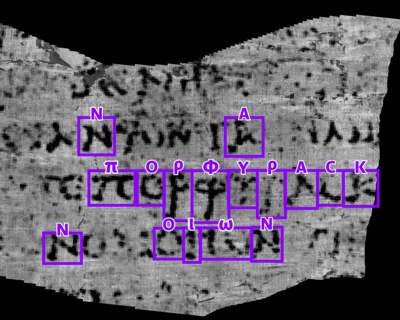| Exciting Progress In Vesuvius Challenge |
| Written by Sue Gee |
| Friday, 13 October 2023 |
|
An important breakthrough has been made in the Vesuvius Challenge leading to the award this week of the First Letters Prize of $40,000 to Luke Farritor, a 21-year-old Computer Science student from the University of Nebraska. The goal of being able to read four or more passages from inside one of the Herculaneum papyri, burnt and buried under twenty metres of mud and ash during the eruption of Vesuvius in AD 79, for which there is a prize of $700,000, now seems to achievable before the end of 2023. This is my third report about the Vesuvius Challenge which is using computer vision and machine learning and the efforts of many researchers to recover knowledge from papyri originally housed in a luxury villa in Herculaneum. The first, Can ML Unlock The Secrets of the Herculaneum Scrolls? came just after the launch of the contest in March 2023. The second, in August, covered the progress made in the first phase of the contest, concerned with seeing inside the scrolls and detecting the presence of ink and included news of further prizes. As well as $35,000 for Scroll Segmentation tools for identifying sheets of papyrus in a 3D scan of a scroll, $50,000 was put on the table as the First Letters prize which required contestants to find at least 10 letters in a 4 cm2 area and was intended to provide a stepping stone towards the main prize: The purpose of this prize is to close the gap between the Ink Detection Prize on Kaggle, and the much more difficult Grand Prize. We’ll learn a lot from this: what segmentation and flattening techniques work best; what ink detection methods work well in the full scrolls, and other things we can’t predict now. News that not just letters but a complete word, Greek πορφύρας, meaning ‘purple’, had been found within one of the scrolls was reported in Nature on October 12th, 2023.
The same day the First Letters Prizes were awarded at an event at the University of Kentucky - the institution where Dr Brent Seales, one of the co-founders of the Vesuvius challenge, and his team have spent years developing methods to “virtually unwrap” the papyri using X-ray computed tomography (CT) scans, and to visualize them as a series of flat images. Luke Farritor, awarded the $40,000 prize for making the first submission of recognizable letters, was present and Youssef Nader, who discovered the same word in the same area with even clearer results, and was awarded the second-place prize of $10,000 appeared by video. These breakthroughs both relied on progress made in ink detection by Casey Handmer who has been awarded a $10,000 First Ink Prize for his contribution which consolidates the idea that the Vesuvius Challenge is a great example of how sharing results can lead to scientific advances. More details of the background to the Vesuvius Challenge is included in the video of the event. As well as outlining the progress made to date, it reveals the expectation that it will be possible for researchers to read at least four passages from inside the scrolls before the deadline of December 31st, 2023.
More InformationFirst word discovered in unopened Herculaneum scroll by 21yo computer science student AI reads text from ancient Herculaneum scroll for the first time Related ArticlesCan ML Unlock The Secrets of the Herculaneum Scrolls? Vesuvius Challenge - Progress and Prizes
|
| Last Updated ( Saturday, 10 February 2024 ) |
